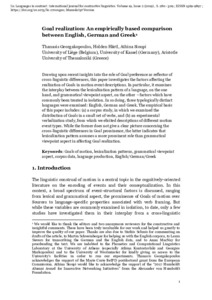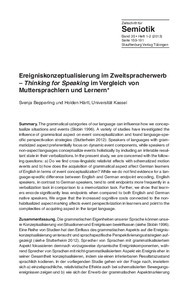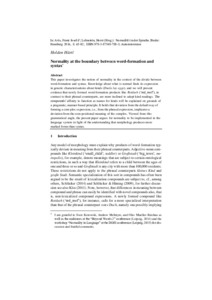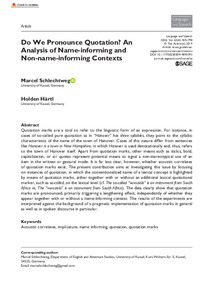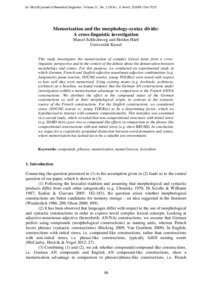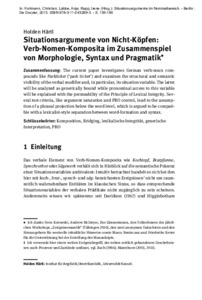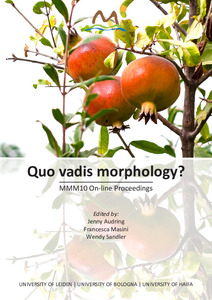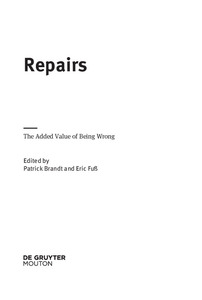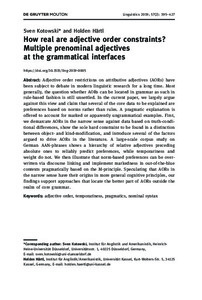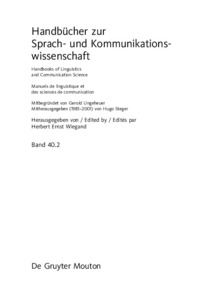Suche
Anzeige der Dokumente 1-10 von 21
Aufsatz
 Goal realization: An empirically based comparison between English, German and Greek
Goal realization: An empirically based comparison between English, German and Greek
(2018)
Drawing upon recent insights into the role of Goal preference as reflector of cross-linguistic differences, this paper investigates the factors affecting the realization of Goals in motion event descriptions. In particular, it examines the interplay between the lexicalization pattern of a language, on the one hand, and grammatical viewpoint aspect, on the other – factors which have commonly been treated in isolation. In so doing, three typologically distinct languages were examined: English, German and Greek. The ...
Aufsatz
 Ereigniskonzeptualisierung im Zweitspracherwerb - Thinking for Speaking im Vergleich von Muttersprachlern und Lernern
Ereigniskonzeptualisierung im Zweitspracherwerb - Thinking for Speaking im Vergleich von Muttersprachlern und Lernern
(2013)
The grammatical categories of our language can influence how we concep-tualize situations and events (Slobin 1996). A variety of studies have investigated the influence of grammatical aspect on event conceptualization and found language-specific perspectivation strategies (Stutterheim 2012): Speakers of languages with grammaticized aspect preferentially focus on dynamic event components, while speakers of non-aspect languages conceptualize events holistically by including an inferable resultant state in their ...
Teil eines Buches
 Normality at the boundary between word-formation and syntax
Normality at the boundary between word-formation and syntax
(Buske, 2016)
This paper investigates the notion of normality in the context of the divide between word-formation and syntax. Knowledge about what is normal finds its expression in generic characterizations about kinds (Ducks lay eggs), and we will present evidence that newly formed word-formation products like 'Rotdach' (‘red_roof’), in contrast to their phrasal counterparts, are more inclined to adopt kind readings. The compounds’ affinity to function as names for kinds will be explained on grounds of a pragmatic, manner-based ...
Aufsatz
 Do We Pronounce Quotation? An Analysis of Name-informing and Non-name-informing Contexts
Do We Pronounce Quotation? An Analysis of Name-informing and Non-name-informing Contexts
(2019-12-23)
Quotation marks are a tool to refer to the linguistic form of an expression. For instance, in cases of so-called pure quotation as in “Hanover” has three syllables, they point to the syllabic characteristics of the name of the town of Hanover. Cases of this nature differ from sentences like Hanover is a town in New Hampshire, in which Hanover is used denotationally and, thus, refers to the town of Hanover itself. Apart from quotation marks, other means such as italics, bold, capitalization, or air quotes represent ...
Aufsatz
 Memorization and the morphology-syntax divide: A cross-linguistic investigation
Memorization and the morphology-syntax divide: A cross-linguistic investigation
(2016)
This study investigates the memorization of complex lexical items from a cross-linguistic perspective and in the context of the debate about the demarcation between morphology and syntax. For this purpose, we conducted an experimental study in which German, French and English adjective-noun/noun-adjective combinations (e.g. Jungtourist, jeune touriste, YOUNG tourist, young TOURist) were tested with respectto how well they were memorized. Using existing nouns (e.g. Architekt, architecte, architect) as a baseline, we ...
Teil eines Buches
 Situationsargumente von Nicht-Köpfen: Verb-Nomen-Komposita im Zusammenspiel von Morphologie, Syntax und Pragmatik
Situationsargumente von Nicht-Köpfen: Verb-Nomen-Komposita im Zusammenspiel von Morphologie, Syntax und Pragmatik
(De Gruyter, 2015)
The current paper investigates German verb-noun compounds like Parkticket (‘park ticket’) and examines the structural and semantic visibility of the verbal modifier and, in particular, its situation variable. The latter will be analyzed as generically bound while pronominal access to this variable will be explained with the permeability of the Principle of Lexical Integrity. Several test criteria, like argument saturation and PRO control, lead to the assumption of a phrasal projection below the word level, which is ...
Konferenzveröffentlichung

 The lexicalization of complex constructions: an analysis of adjective-noun combinations
The lexicalization of complex constructions: an analysis of adjective-noun combinations
(Pasithee : Open Access Electronic Publications; Library & Information Center - University of Patras, 2016)
The current paper discusses the lexicalization of complex constructions composed of an adjective and a noun. It is argued that compounds/compound-like constructions are more prone to become lexicalized than phrases/phrase-like constructions. The relationship between lexicalization and the cognitive process of memorization represents a key point of our analysis. We report evidence from psycholinguistic studies contrasting compounds/compound-like constructions to phrases/phrase-like constructions either within a single ...
Teil eines Buches
 Generic rescue: argument alternations the monotonicity condition
Generic rescue: argument alternations the monotonicity condition
(De Gruyter Mouton, 2013)
Generic interpretations as in “The tiger kills to survive” have often been observed to reconstitute the linguistic acceptability of certain verb argument structure modifications. But can the right context rescue everything? This paper investigates the impact a generic interpretation can have on three types of argument alternations: (i) the intransitive use of inherently telic verbs like “to kill”, (ii) the intransitive use of stative verbs like “to love”, and (iii) middle alternations like “it reads easily”. It will ...
Aufsatz
 How real are adjective order constraints? Multiple prenominal adjectives at the grammatical interfaces
How real are adjective order constraints? Multiple prenominal adjectives at the grammatical interfaces
(2019)
Adjective order restrictions on attributive adjectives (AORs) have been subject to debate in modern linguistic research for a long time. Most generally, the question whether AORs can be located in grammar as such in rule-based fashion is still unsettled. In the current paper, we largely argue against this view and claim that several of the core data to be explained are preferences based on norms rather than rules. A pragmatic explanation is offered to account for marked or apparently ungrammatical examples. First, ...
Teil eines Buches
 Argument-structural restrictions on word-formation patterns
Argument-structural restrictions on word-formation patterns
(De Gruyter Mouton, 2015)
The implementation of argument-structural effects on word-formation is a vital aspect in modeling the lexical system and the interface between morphology and syntax. The current article provides an overview of theoretical perspectives in the field and presents analyses of structural principles holding in the domain. A number of test cases relating to fundamental operations, e.g., in compounding and nominalization are discussed, as well as specific conditions restricting the formation of morphologically complex words.

